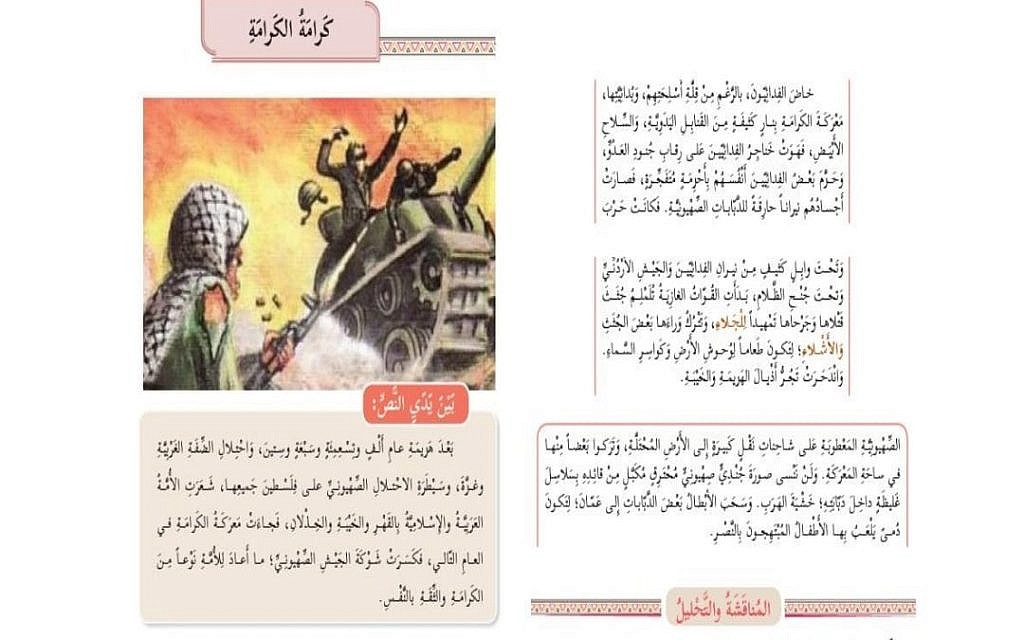Australia/Israel Review
Miseducation leads to terror teens
Mar 28, 2023 | Enia Krivine, Jonathan Conricus

Within a few weeks in January and February, three teenage boys carried out terror attacks against Israelis in Israel’s capital.
What is motivating children to pick up deadly weapons? The official Palestinian Authority (PA) school curriculum demonises Jews and promotes martyrdom.
In late January, 13-year-old Mahmoud Aliwat, from the eastern Jerusalem neighbourhood of Silwan, ambushed a small group of Israeli pedestrians outside of Jerusalem’s Old City, shooting and injuring two.
Then, just a few hours apart on February 13, a 14-year-old Palestinian boy stabbed a Jewish teenager in the Old City, wounding him lightly, while a 13-year-old Palestinian stabbed an Israeli police officer at a checkpoint near the village of Shuafat. The officer was subsequently hit by friendly fire and died from his wounds. Each teen terrorist was apprehended and will stand trial in Israel.
Impact-SE, an international research and policy organisation that monitors education around the world, has done extensive research into the Palestinian Authority curriculum. The PA published its reformed curriculum for grades one to 11 in 2016 and 2017 and, according to the Impact-SE research, it is saturated with incitement to violence, glorification of terror against Jews and Israelis and promises of heavenly rewards for heroes who commit acts of martyrdom.
The curriculum describes Israel as satanic and is rife with antisemitic tropes including Jewish manipulation of global events. It praises Dalal Mughrabi, the woman who took part in the murders of 38 Israelis, including 13 children, on an Israeli bus in 1978, as a “female Arab jihad warrior.” Palestinian children are taught to sacrifice themselves for their homeland and “redeem it with blood.”
The above child terrorists, all residents of Israel’s capital, were likely victims of this kind of miseducation. The Palestinian Authority (PA) school curriculum is taught to more than two million Palestinian children in Gaza, the West Bank and the vast majority of eastern Jerusalem schools. In PA textbooks, Israel doesn’t exist, peace isn’t even an option, and the only way to obtain fame is through jihad. It is no surprise that these children chose to emulate the acts of terrorism glorified in their classrooms, taking the violence to the streets of the city where they were indoctrinated.
Jerusalem is a mixed city made up of mostly Arabs and Jews, with Arabs comprising 38% of the total population. After Israel expelled the Jordanian Army from eastern Jerusalem in 1967, Israel doubled the municipal boundaries of the capital. Its jurisdiction included about a dozen Arab towns, villages and refugee camps housing a few tens of thousands of Arabs, located north, east and south of the Jewish neighbourhoods of Jerusalem.
Today, more than 340,000 Arabs live in these neighbourhoods, have Israeli resident permits and are able to move almost unhindered across Jerusalem and all other parts of Israel. Most work in western Jerusalem and are part of the economic fabric of the city.
With Ramadan – historically a period of increased tensions between Arabs and Jews – beginning, the situation is extremely volatile. The past several months have seen a consistent rise in Palestinian terror attacks, both by established terror organisations like Hamas and Fatah and by unaffiliated youth. So far in 2023, these attacks have killed 15 Israelis and one Ukrainian national. Approximately 80 Palestinians – mostly gunmen but also some civilians – were killed in the same period.
On his recent trip to Israel, US Secretary of State Antony Blinken touted the “enduring goal of Palestinians and Israelis enjoying equal measures of freedom, security, opportunity, justice and dignity.” Washington could contribute to those goals by unequivocally demanding the PA radically reform its curriculum so that Palestinian schools become a place where children can develop skills, humane values and hope.
Without reform in Palestinian schools, child terrorists will tragically become more of a norm and less of an exception.
Jonathan Conricus is an adviser to the Foundation for Defense of Democracies, focusing on the Middle East, terrorism, media and information warfare. Enia Krivine is the senior director of the Israel Program and the National Security Network at the Foundation for Defense of Democracies. © Jerusalem Post (www.jpost.com), reprinted by permission, all rights reserved.
Tags: Israel, Palestinians, Terrorism






